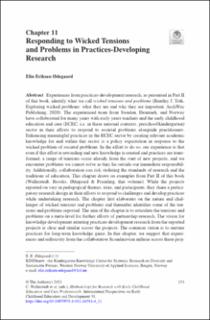| dc.contributor.author | Ødegaard, Elin Eriksen | |
| dc.date.accessioned | 2023-08-22T13:51:19Z | |
| dc.date.available | 2023-08-22T13:51:19Z | |
| dc.date.created | 2022-07-21T21:10:46Z | |
| dc.date.issued | 2023 | |
| dc.identifier.isbn | 9783031145858 | |
| dc.identifier.uri | https://hdl.handle.net/11250/3085294 | |
| dc.description.abstract | Experiences from practices-development research, as presented in Part II of this book, identify what we call wicked tensions and problems (Bentley J, Toth. Exploring wicked problems: what they are and why they are important. ArchWay Publishing, 2020). The experienced team from Sweden, Denmark, and Norway have collaborated for many years with early years teachers and the early childhood education and care (ECEC; i.e. in these national contexts, preschool/kindergarten) sector in their efforts to respond to societal problems alongside practitioners. Enhancing meaningful practices in the ECEC sector by creating relevant academic knowledge for and within this sector is a policy expectation in response to the wicked problem of societal problems. In the effort to do so, our experience is that even if this effort is rewarding and new knowledge is created and practices are transformed, a range of tensions occur already from the start of new projects, and we encounter problems we cannot solve as they lie outside our immediate responsibility. Additionally, collaboration can risk violating the standards of research and the traditions of education. This chapter draws on examples from Part II of this book (Wallerstedt, Brooks, Ødegaard & Pramling, this volume). While the projects reported on vary in pedagogical themes, sites, and participants, they share a participatory research design in their efforts to respond to challenges and develop practices while undertaking research. The chapter first elaborates on the nature and challenges of wicked tensions and problems and thereafter identifies some of the tensions and problems reported. The aim of the chapter is to articulate the tensions and problems on a meta-level for further efforts of partnership research. The vision for knowledge development entering practices-development research from the reported projects is clear and similar across the projects. The common vision is to nurture practices for long-term knowledge gains. In this chapter, we suggest that experiences and reflexivity from the collaborative Scandinavian milieus across these projects can articulate some wicked tensions and problems and improve knowledge in this regard. The chapter provides a summary list of recommendations for stakeholders to consider when planning and conducting participatory design research. | en_US |
| dc.language.iso | eng | en_US |
| dc.relation.ispartof | Methodology for Research with Early Childhood Education and Care Professionals - Example Studies and Theoretical Elaboration | |
| dc.rights | Navngivelse 4.0 Internasjonal | * |
| dc.rights.uri | http://creativecommons.org/licenses/by/4.0/deed.no | * |
| dc.subject | Barnehage | en_US |
| dc.subject | Early childhood education | en_US |
| dc.subject | Grunnlagsproblemer | en_US |
| dc.subject | Epistemology | en_US |
| dc.subject | Praksisbasert forskning | en_US |
| dc.subject | Practise based research | en_US |
| dc.title | Responding to wicked tensions and problems in practices-developing research | en_US |
| dc.type | Chapter | en_US |
| dc.type | Peer reviewed | en_US |
| dc.description.version | publishedVersion | en_US |
| dc.rights.holder | © 2023 The Author(s) | en_US |
| dc.subject.nsi | VDP::Samfunnsvitenskap: 200 | en_US |
| dc.subject.nsi | VDP::Social sciences: 200 | en_US |
| dc.subject.nsi | VDP::Samfunnsvitenskap: 200 | en_US |
| dc.subject.nsi | VDP::Social sciences: 200 | en_US |
| dc.source.pagenumber | 153-169 | en_US |
| dc.identifier.doi | 10.1007/978-3-031-14583-4_11 | |
| dc.identifier.cristin | 2039045 | |
| dc.relation.project | Norges forskningsråd: 326797 | en_US |
| dc.relation.project | Norges forskningsråd: 275575 | en_US |
| cristin.ispublished | true | |
| cristin.fulltext | original | |
| cristin.qualitycode | 1 | |

